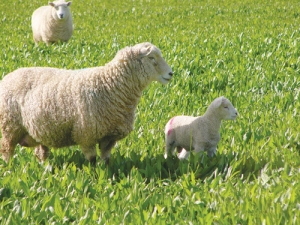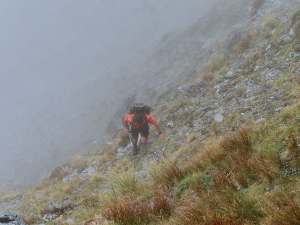The sheep production research team at Massey University is busy this spring doing lots of studies on Massey University's agricultural experiment stations.
At the Riverside farm, in Wairarapa, two studies are underway. Examining the use of lucerne compared to ryegrass/white clover in lactation and the impacts of early weaning (7 weeks of age) on lamb performance is being investigated.
In addition, the use of lucerne and herb and clover mixes is being looked at as a management option to improve the live weights of twin bearing hoggets and their lambs at weaning in comparison to ryegrass/white clover. A further study is examining the effect of stocking rate (11 to 15 ewes per ha) for single bearing ewes on ryegrass white clover.
Riverside farm is also the site of a multi-year study examining the impacts of body condition score and live weight on ewe performance. Later this spring, a new multi-year programme led by Dr Brennon Wood will focus on learning and technology transfer with local farmers.
On Massey's Keebles and Tuapaka farms in Manawatu, the use of herb clover mixes for early weaning on finishing country and hill country is being studied.
Research from 2014 suggested that early weaning on herb and clover mixes produces faster lamb growth rates compared to those left with their dams on ryegrass/white clover. The use of these mixes as a tool to get single born lambs to slaughter at a younger age is also being investigated.
Two other studies are underway examining the impacts of various ryegrass/white clover feeding regimens during pregnancy on lamb performance to weaning.
Post weaning, the influence of lamb slaughter age on meat quality is also being investigated with a focus on measuring collagen as a key contributor to tenderness. In addition the performance of ewes born – to either ewe hoggets or mature ewes – is being monitored to provide information on the long term impacts of selecting progeny born to ewe hoggets.
The impacts of body condition score and live weight on ewe performance are also being studied on these farms as is the amount of feed required to change condition score. The influence of milk composition and early pellet supplementation is being scrutinised to improve knowledge of factors controlling lamb growth.
Research is also taking place on commercial farms. On a number of farms factors affecting the longevity of ewes are being investigated as part of a long term project. The causes of hogget foetal loss are being examined and information on the impact of hogget breeding on lifetime performance is being collected.
Many of these studies are being done with research partners including Gravida, Taratahi and Lincoln University. Plans are already laid for further research in 2016 with these research partners and AgResearch.
Massey's sheep research team includes professors Paul Kenyon, Steve Morris, Hugh Blair, Patrick Morel, Peter Kemp, Kevin Stafford and Drs Anne Ridler, Rene Corner-Thomas, Nicola Schreurs, Rebecca Hickson and Lydia Cranston, Kate Griffiths and postgraduate students.
Funders include Beef + Lamb NZ, the C Alma Baker Trust, Massey University and the Sustainable Farming Fund.










